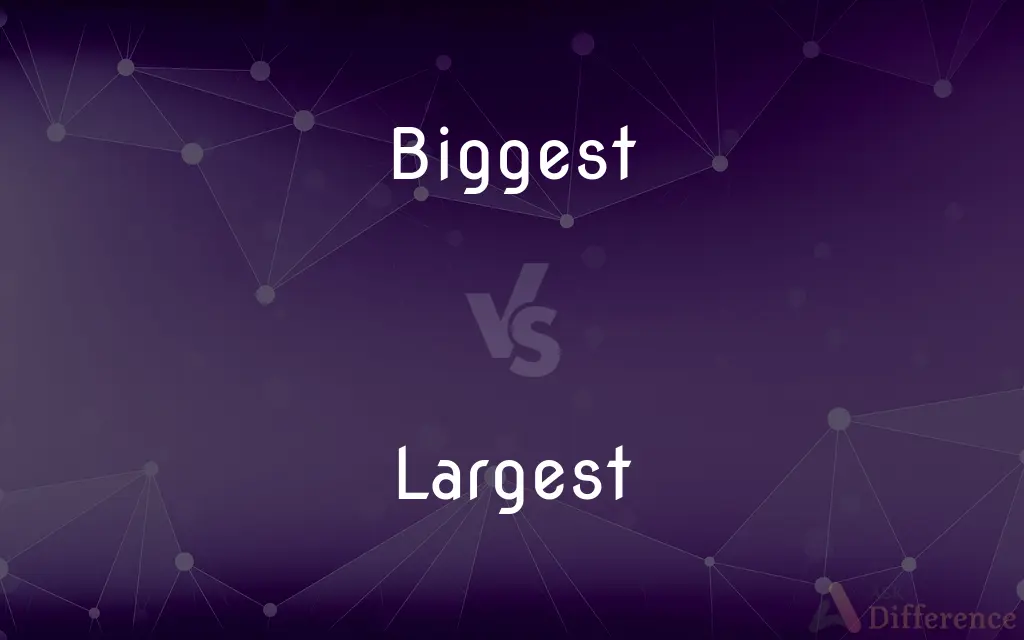Biggest vs. Largest — What's the Difference?
By Tayyaba Rehman & Maham Liaqat — Updated on March 14, 2024
"Biggest" generally refers to size or extent, encompassing a wide range of attributes, while "largest" is more specific to physical dimensions or volume.

Difference Between Biggest and Largest
Table of Contents
ADVERTISEMENT
Key Differences
"Biggest" can apply to both tangible and intangible concepts, such as the biggest event (in terms of importance or impact) or the biggest idea (in terms of scope or innovation). It is a more versatile term that can describe significance, impact, or size in a broad sense. On the other hand, "largest" is typically used to describe physical entities in terms of spatial dimensions, capacity, or volume, such as the largest country (by area) or the largest building (by volume or footprint).
While "biggest" can be subjective, reflecting perceived importance or influence, "largest" is objective, often quantifiable through measurements like length, width, height, or volume. For example, one might debate the biggest movie of the year based on criteria like cultural impact, box office earnings, or critical acclaim, whereas the largest movie theater can be determined by seating capacity or screen size.
In usage, "biggest" often appears in more informal or conversational contexts, capturing a broad sense of size or significance. "Largest," however, is preferred in scientific, geographic, or technical descriptions where precise dimensions are discussed.
Despite their nuances, "biggest" and "largest" are sometimes used interchangeably in everyday language, especially when the distinction between abstract and physical size is blurred or deemed unimportant. However, understanding the subtleties between them can enhance clarity and precision in communication.
Comparison Chart
Scope
Can refer to size, importance, or impact
Specifically refers to physical dimensions or volume
ADVERTISEMENT
Application
Both tangible and intangible concepts
Primarily tangible, physical entities
Subjectivity
Can be subjective
Generally objective and quantifiable
Usage Context
Informal or broad discussions
Scientific, geographic, technical contexts
Examples
Biggest victory, biggest fear
Largest continent, largest ocean
Compare with Definitions
Biggest
Refers to the greatest size, extent, or importance.
The championship game was the biggest event of the year.
Largest
Used for quantifiable measurements of physical entities.
The Pacific Ocean is the largest ocean on Earth.
Biggest
Applies to both physical size and abstract concepts like importance.
The discovery was one of the biggest breakthroughs in science.
Largest
Often found in scientific, technical, or formal descriptions.
The blue whale is the largest animal known to have ever existed.
Biggest
Can reflect a subjective assessment of significance or impact.
For many, their wedding day is their biggest day.
Largest
Pertains to the greatest in physical size, area, or volume.
Asia is the largest continent by land area.
Biggest
Commonly used in informal or conversational contexts.
That's the biggest pizza I've ever seen!
Largest
Involves objective, measurable attributes.
The company built the largest solar power plant in the region.
Biggest
Of considerable size, number, quantity, magnitude, or extent; large.
Largest
Of greater than average size, extent, quantity, or amount; big.
Biggest
Having great strength or force
A big wind.
In a big rage.
Largest
Of greater than average scope, breadth, or capacity; comprehensive.
Biggest
Of great significance; momentous
A big decision.
A big victory.
Largest
Important; significant
Had a large role in the negotiations.
A large producer of paper goods.
Biggest
Mature or grown-up
Big enough to take the bus by herself.
Largest
Understanding and tolerant; liberal
A large and generous spirit.
Biggest
Older or eldest. Used especially of a sibling
My big brother is leaving for college next week.
Largest
Of great magnitude or intensity; grand
“a rigid resistance to the large emotions” (Stephen Koch).
Biggest
Filled up; brimming over
Felt big with love.
Largest
Pretentious; boastful. Used of speech or manners.
Biggest
Bountiful; generous
Had a big heart.
Largest
(Obsolete) Gross; coarse. Used of speech or language.
Biggest
Pregnant
Big with child.
Largest
(Nautical) Favorable. Used of a wind.
Biggest
Having or exercising considerable authority, control, or influence
A big official.
A big chief.
Largest
(Slang) A thousand dollars
Bought a speedboat for 50 large.
Biggest
Conspicuous in position, wealth, or importance; prominent
A big figure in the peace movement.
Largest
Greatest in size of those under consideration.
Biggest
Loud and firm; resounding
A big voice.
Largest
Maximal.
Biggest
(Informal) Widely liked, used, or practiced; popular
"The Minneapolis indie-rock band was big in the blogosphere, beloved by hipsters, and unknown to pretty much everyone else" (Robert Levine).
Largest
Greatest in size of those under consideration
Biggest
(Informal) Self-important; cocky
You're too big for your own good.
Largest
Maximal in amount;
A maximal amount
An outside estimate
Biggest
In a pretentious or boastful way
Talked big about the new job.
Biggest
With considerable success
Made it big with their recent best-selling album.
Biggest
In a thorough or unmistakable way; emphatically
Failed big at the box office.
Biggest
Greatest in size of those under consideration
Common Curiosities
Can "biggest" and "largest" be used for populations?
Yes, "largest" is often used to refer to the population size (e.g., the largest city by population), while "biggest" could be used in a more informal context or to imply a broader significance.
Can a company be described as the biggest or the largest?
A company can be described as the "biggest" in terms of its market influence, revenue, or valuation, and as the "largest" in terms of physical size, number of employees, or production capacity.
How do I decide whether to use "biggest" or "largest"?
Consider whether you're discussing physical dimensions (use "largest") or a broader sense of size, importance, or impact (use "biggest").
Is it correct to say "the biggest amount"?
While not incorrect, "the largest amount" might be more precise if referring to quantifiable measurements. "The biggest amount" could imply a broader or more subjective significance.
Can "biggest" and "largest" apply to abstract concepts like emotions or ideas?
"Biggest" can apply to abstract concepts, such as the biggest fear or idea, implying significance or scope. "Largest" typically does not apply to abstract concepts.
Can a sports team be the biggest or largest?
A sports team can be described as the "biggest" in terms of popularity, fan base, or achievements, and as the "largest" in terms of team size or physical stature of its players.
Is "biggest" ever used in scientific measurements?
"Biggest" is less common in scientific measurements, which tend to favor precise terms like "largest" for clarity and accuracy.
Can a book or movie title be the biggest or largest?
A book or movie can be described as the "biggest" in terms of sales, impact, or popularity, but "largest" would typically not apply unless referring to the physical size of a book or the length of a film.
How do "biggest" and "largest" relate to achievements or records?
Achievements or records can be described as the "biggest" when implying their significance or impact, and as the "largest" when referring to quantifiable attributes like distance, size, or number.
Can an object be both the biggest and the largest?
Yes, an object can be both the biggest and the largest if it is the greatest in size and also holds the greatest significance or importance in a particular context.
How do cultural perceptions affect the use of "biggest" vs. "largest"?
Cultural perceptions can influence what is considered the "biggest" in terms of significance or impact, while "largest" remains more universally understood based on physical measurements.
How do translations affect the use of "biggest" and "largest"?
In translation, the distinction between "biggest" and "largest" must be carefully considered to maintain the intended meaning, as some languages may not differentiate as clearly between size and significance.
How does the use of "biggest" vs. "largest" change in marketing or advertising?
In marketing, "biggest" is often used to emphasize the significance of a sale, event, or product feature, while "largest" might be used to convey factual information about size or capacity.
Can landscapes or natural features be described as the biggest or largest?
Natural features are typically described as the "largest" when referring to physical dimensions (e.g., the largest desert), but "biggest" could be used in a more poetic or subjective sense (e.g., the biggest sunset).
Is it appropriate to use "biggest" in formal writing?
While not inappropriate, "biggest" may be less common in formal writing where more precise terms like "largest" are preferred for clarity.
Share Your Discovery

Previous Comparison
Betrayer vs. Traitor
Next Comparison
Discrimination vs. InequalityAuthor Spotlight
Written by
Tayyaba RehmanTayyaba Rehman is a distinguished writer, currently serving as a primary contributor to askdifference.com. As a researcher in semantics and etymology, Tayyaba's passion for the complexity of languages and their distinctions has found a perfect home on the platform. Tayyaba delves into the intricacies of language, distinguishing between commonly confused words and phrases, thereby providing clarity for readers worldwide.
Co-written by
Maham Liaqat













































